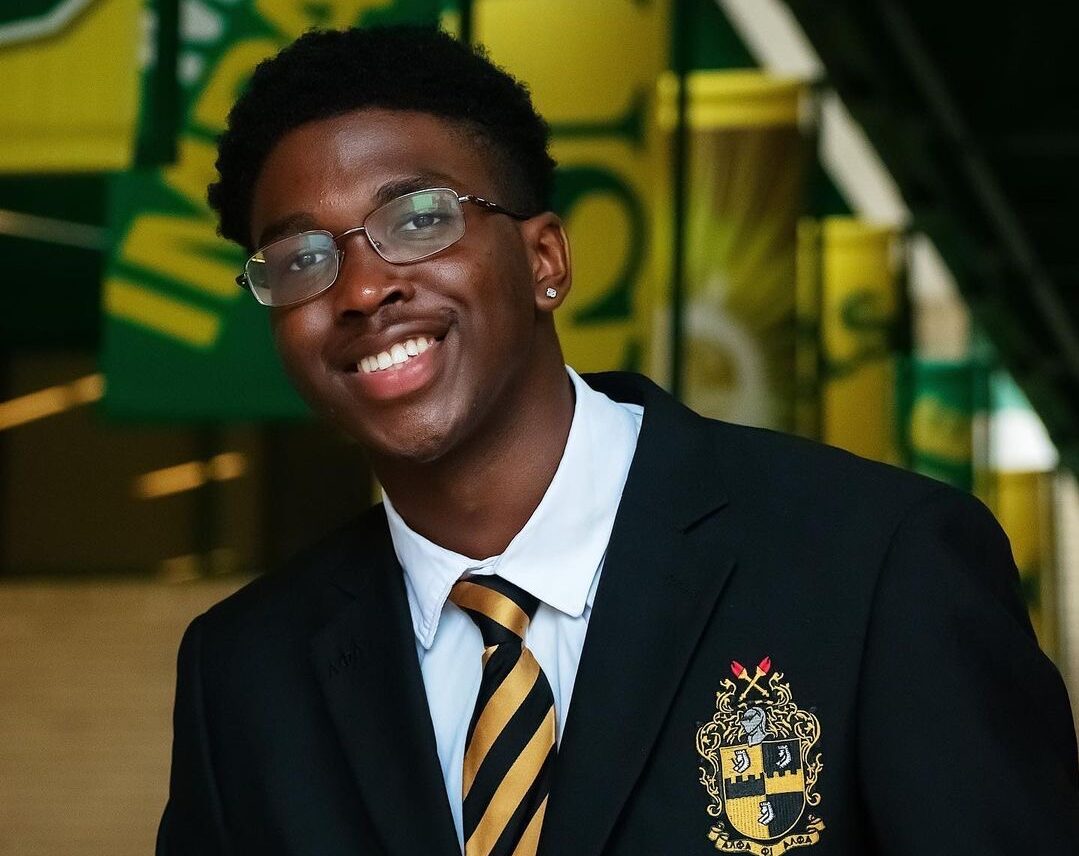Change for the community: Goziem Nwafor creates unity, safe spaces for African Americans

This story is part of a continuing series that features Black leaders at USF during Black Heritage Month.
From a young age, Goziem Nwafor devotedly watched the show “Static Shock,” which starred a Black superhero fighting crime. Being one of the few Black students in his elementary classes, the image of a young, Black hero fighting crime and racism resonated with Nwafor.
“Even though it was a show that was for kids my age, it spoke about important topics that we should know about, racism, gun [and gang] violence and bullying,” he said.
Today, as a junior majoring in information technology, Nwafor continues to spread his message in the Alpha Phi Alpha Fraternity and the community as a whole, creating awareness for racial issues.
Nwafor was born and raised in Tallahassee, but just before he turned 8 years old, his family moved to their native country, Nigeria. There, he attended a boarding school, which he said forced him to become self-reliant.
“It just taught me to be independent,” Nwafor said. “It gave me a wake-up call that I need to be able to handle things on my own.”
He believes this has been one of the driving factors toward being able to push himself to be involved in so many organizations and be in the position he is in today.
Cultural roots had always played a role in his life growing up, as he and his siblings’ names were traditional Nigerian names.
However, his full immersion in Nigerian norms became apparent when his family returned to the U.S. when Nwafor was 14.
When his family relocated to the U.S., Nwafor and his siblings went to live with their uncle in Dallas, while his parents remained briefly in Nigeria to finish the process of moving to the U.S.
In Texas, he attended Bishop Lynch High School (BLHS), where he was one of the few Black students, he said.
It took him time to feel confident enough to make friends with some other students because he felt he couldn’t relate to them after being raised in a different culture.
Nwafor said there were different phrases and pop culture references in Nigeria which he could no longer use.
His return to the U.S. highlighted the separation between continental Africans — such as Nwafor — and the diaspora Africans.
“There’s just a disconnect, because we didn’t really understand each other and didn’t really know that we’re all one and the same,” Nwafor said.
Nwafor’s passion for creating unity manifested in the BLHS Pan-African Club, which he founded while he was a junior. His goal was to create a space for Black students to bond.
“What I tried to do was create a sense of belonging for the black students in our school because it’s easy to kind of lose that sense of pride — a sense of self within our Blackness, within a very much white school,” Nwafor said.
“I just wanted to create that safe haven for us to be able to grow our appreciation for ourselves, and be able to connect with one another a lot better.”
Nwafor was first exposed to Pan-Africanism as a concept in his sophomore year of college while watching videos of other well-known Pan-Africanists, including Malcolm X, WEB DuBois and Marcus Garvey.
Pan-Africanism is the social movement pushing for unity between all of the African American community.
He said he connected with the belief as it represented a solution for some of the issues faced by the Black community.
“This is what we need,” he said. “This is the foundation for how we can all, as people, unite and move forward as a unit.”
Nwafor said he created a quote that represents his beliefs in creating a safe community for African Americans that he uses often, “We need to bring Afrocentricity to the vicinity.”
“We have to bring our blackness, the full effects, raw and uncut everywhere because it’s beautiful,” he said. “It shouldn’t be dimmed for anyone.”
At USF, Nwafor has been involved in several organizations surrounding racial activism, including the USF chapter of the National Association for the Advancement of Colored People and Alpha Phi Alpha — the oldest intercollegiate fraternity for African American men.
It was in Alpha Phi Alpha that he met Ryan Austin, a first-year graduate student in biomedical engineering, where they worked together on projects for the fraternity.
He has really been able to watch Nwafor’s growth over the years he has been at USF, according to Austin.
“Just seeing everything that he’s accomplished, going from that shy, friendly guy, to becoming a USF ambassador, to holding different positions in our chapter,” he said.
“He got this opportunity for the lecture series, and I messaged him. I told him ‘I’m really proud of you for all you’ve done. I’ve definitely seen all your growth.’”
In continuing his push for the Pan-Africanist movement, Nwafor said he hopes to help push more African Americans into positions of ownership and leadership, in businesses and institutions.
Nwafor is well-known on campus for his friendly demeanor and the way that he is outspoken for his cause, according to Austin. He expects that Nwafor will be able to support his passions for supporting the Black community long into the future.
“He’s strong in his beliefs and I know that he’s very productive,” Austin said.
“I feel like if there was ever a time that there was a need for someone like [Malcolm X] to step up, to make change, I definitely see that he could be someone to do that.”






